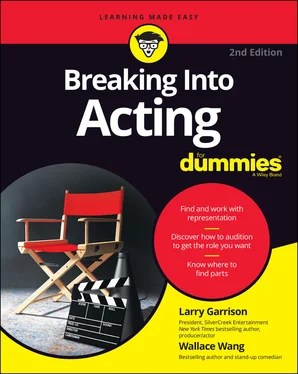 When performing on many TV shows, such as situation comedies (sitcoms), actors usually perform in front of a live audience while the cameras are rolling at the same time. That way the studio can record the audience’s laughter to play back when the show finally airs, which is called a laugh track.
When performing on many TV shows, such as situation comedies (sitcoms), actors usually perform in front of a live audience while the cameras are rolling at the same time. That way the studio can record the audience’s laughter to play back when the show finally airs, which is called a laugh track.
For films that use special effects, the actors may be required to express intense emotions in a close-up with the camera while staring at nothing at all. During post-production, the director adds in the special effects, such as a computer-generated dinosaur leaping out at the actor or a volcano suddenly erupting in the distance.
 An actor may have to respond to another actor who may not appear on camera. Rather than require this other actor to stare at nothing, it’s common courtesy to read your lines off camera to make it easier for the actor on camera to respond to a real person rather than to an imaginary one. If you’re the one on-camera, the other actors may not be as courteous, and you may find yourself trying to react all by yourself while staring at a camera and a blank wall.
An actor may have to respond to another actor who may not appear on camera. Rather than require this other actor to stare at nothing, it’s common courtesy to read your lines off camera to make it easier for the actor on camera to respond to a real person rather than to an imaginary one. If you’re the one on-camera, the other actors may not be as courteous, and you may find yourself trying to react all by yourself while staring at a camera and a blank wall.
THE COLLABORATIVE NATURE OF SHOW BUSINESS
Show business is a collaborative business. Although an actor may stand alone in the spotlight, they never would’ve gotten there without the combined work of a writer, director, producer, makeup artist, and costume designer (among other people). When starting a project, everyone tries to surround themselves with the best possible people for the job because the better other people do their job, the better you look in doing your job. Having a small role in a blockbuster hit is infinitely preferable to having a starring role in a bomb that becomes the butt of jokes for years to come.
Naturally, working with other people can never be completely harmonious. Sometimes people have minor disagreements that can be settled with a little bit of talk and compromise, and sometimes major stars clash egos with major directors or producers, creating a war-like atmosphere for everyone involved on the set. Sometimes perfectly good projects are abandoned because the people involved can’t get along, despite everyone having excellent qualifications for doing their jobs.
When any project is being developed, finding the right people to work on it is only one problem. Getting everyone to work together toward a common goal can create a completely different set of problems. As an actor, do your best to make sure that you’re not part (or the source) of any problems, and you increase your chances of working with the same people again in the future. Given a choice between working with an actor who nobody can stand or someone more likeable and easy to work with (hopefully you), guess which actor most people will hire for the job? See Chapter 11to discover how to adapt to different personalities.
Cleaning Up in Post-Production
Post-production occurs after the initial filming of a movie, TV show, or commercial is completed but before the final film or tape is shown to the general public.
 Although post-production is a process associated with film and TV, a sort of post-production occurs in stage plays as well. After the initial performance, the actors, director, and writer may alter lines or entire scenes in the script from one show to the next in an effort to fine-tune the show, depending on the audience’s reactions. If you feel that a certain line doesn’t work or needs to be changed, consult with the director or playwright before changing your lines.
Although post-production is a process associated with film and TV, a sort of post-production occurs in stage plays as well. After the initial performance, the actors, director, and writer may alter lines or entire scenes in the script from one show to the next in an effort to fine-tune the show, depending on the audience’s reactions. If you feel that a certain line doesn’t work or needs to be changed, consult with the director or playwright before changing your lines.
 During post-production of a movie or a TV show, the director, producer, and/or editor may cut out entire scenes or dialogue, add music (called scoring), and add special effects and sound effects. If the sound quality is poor in certain scenes, the actors may be asked to watch the film of themselves and dub in their own dialogue — a process known as looping (also known as automated dialogue replacement [ADR]). Sometimes, a director may ask another actor to loop in dialogue. So in the final film, you may appear, but another actor’s voice is coming out of your mouth.
During post-production of a movie or a TV show, the director, producer, and/or editor may cut out entire scenes or dialogue, add music (called scoring), and add special effects and sound effects. If the sound quality is poor in certain scenes, the actors may be asked to watch the film of themselves and dub in their own dialogue — a process known as looping (also known as automated dialogue replacement [ADR]). Sometimes, a director may ask another actor to loop in dialogue. So in the final film, you may appear, but another actor’s voice is coming out of your mouth.
In rare cases, the director may reshoot unsatisfactory scenes (an expensive process, especially if the scene was shot in a distant location like Russia or aboard a nuclear aircraft carrier) or shoot entirely new scenes to help the continuity of the film.
 During post-production, an entire scene that you appeared in may very well get cut and wind up on the cutting room floor. That’s show business. (Of course, if you buy the DVD version of a movie, you can often see the cut scenes. Sometimes, though, the cut scenes are so out of place that even the DVD version won’t show them.)
During post-production, an entire scene that you appeared in may very well get cut and wind up on the cutting room floor. That’s show business. (Of course, if you buy the DVD version of a movie, you can often see the cut scenes. Sometimes, though, the cut scenes are so out of place that even the DVD version won’t show them.)
 Post-production can radically change the mood of a film, depending on how the director cuts and edits it. That’s why you see so many films marketed as the director’s cut, which is usually slightly or drastically different from the final cut that the studio ultimately released.
Post-production can radically change the mood of a film, depending on how the director cuts and edits it. That’s why you see so many films marketed as the director’s cut, which is usually slightly or drastically different from the final cut that the studio ultimately released.
After all the cuts and edits have been made, the final product is often reviewed and approved by many different people before it’s released to the public. Who does the viewing and approving depends on the kind of project. For example, before a TV commercial can appear on the air, the client must approve it. If the client doesn’t like the TV commercial, it may never be aired. To test an audience’s reaction to a film, studios usually offer special screenings to test audiences. Depending on the reaction of the test audiences, certain scenes may be dropped or new ones added.
After the director finishes editing a film, TV show, or commercial, and the finished product is approved, the final step is distribution.
 THE MAGIC OF RESIDUALS
THE MAGIC OF RESIDUALS
Acting is a job. The biggest difference between working in an ordinary job and working as an actor is that as an actor in film, television, and commercials, you may get paid many times for doing a job once. The first time, you get paid for doing your job; after that, you may get paid each time your part of the show is broadcast again. Each time that a commercial runs on the air, a TV show is rerun, or a film is broadcast on pay-per-view, television networks, or in overseas markets, you get a residual (or royalty). Some commercials and TV shows have buyouts where you may receive no residuals at all. If you’re in a union, fees are set, and residuals may be required unless there is a buyout.
Residuals are money paid to you for the privilege of broadcasting your performance over and over again. Your agent or the union rules usually stipulates the exact percentage of your residuals, although for smaller roles, you may receive no residuals at all.
Читать дальше

 When performing on many TV shows, such as situation comedies (sitcoms), actors usually perform in front of a live audience while the cameras are rolling at the same time. That way the studio can record the audience’s laughter to play back when the show finally airs, which is called a laugh track.
When performing on many TV shows, such as situation comedies (sitcoms), actors usually perform in front of a live audience while the cameras are rolling at the same time. That way the studio can record the audience’s laughter to play back when the show finally airs, which is called a laugh track. An actor may have to respond to another actor who may not appear on camera. Rather than require this other actor to stare at nothing, it’s common courtesy to read your lines off camera to make it easier for the actor on camera to respond to a real person rather than to an imaginary one. If you’re the one on-camera, the other actors may not be as courteous, and you may find yourself trying to react all by yourself while staring at a camera and a blank wall.
An actor may have to respond to another actor who may not appear on camera. Rather than require this other actor to stare at nothing, it’s common courtesy to read your lines off camera to make it easier for the actor on camera to respond to a real person rather than to an imaginary one. If you’re the one on-camera, the other actors may not be as courteous, and you may find yourself trying to react all by yourself while staring at a camera and a blank wall.










